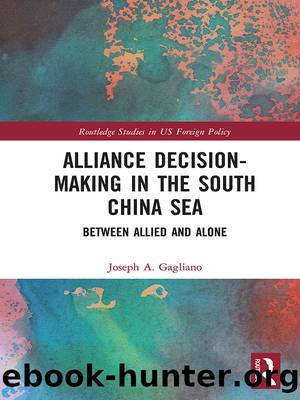Alliance Decision-Making in the South China Sea: Between Allied and Alone by Joseph A Gagliano

Author:Joseph A Gagliano [Gagliano, Joseph A]
Language: eng
Format: epub
Tags: International Relations, Diplomacy, General, Political Science, Treaties
ISBN: 9781351183970
Google: -NmMDwAAQBAJ
Goodreads: 42451496
Publisher: Routledge
Published: 2019-03-04T00:00:00+00:00
Pre-normalization U.S.âVietnam relations were colored deeply by the SovietâVietnamese relationship. One must be careful, however, not to draw causal lines too clearly between expanding SovietâVietnamese ties and the normalization rebuff, or vice versa for that matter, as the relationships between the Soviet Union, United States, China and Vietnam were mutually constitutive. To be sure, Vietnamâs perception of China as a threat from the north motivated it to seek a security patron for regime survival, evidenced primarily by Vietnamâs entry into the CMEA bloc and signing of the SovietâVietnamese Treaty of Friendship and Cooperation.75 Hanoi subsequently granted base access to Soviet forces, including port calls for naval ships, airstrips for surveillance aircraft, and building military facilities for signals intelligence and electronic sensors.76
While pursuing causation in this respect is chimerical, it is sufficient to understand that the Cold War environment, including the effect of China and Cambodia on geopolitical dynamics, spoiled the possibility of a normalized U.S.âVietnamese relationship. Once Hanoi began down the path of deeper relations with Moscow, it reduced the potential for rapprochement with Washington; and the further down the path it went, the harder it became to extract itself from Soviet association. By 1980, Vietnam depended on the Soviet Union for twenty percent of its food and one-hundred percent of its weaponry for the Cambodia campaign.77
The quickly evolving Sino-U.S. relationship ahead of Chinaâs 1979 invasion of Vietnam considerably affected U.S.âVietnamese relations. China was Vietnamâs largest and closest threat, and direct meetings between U.S. and Chinese officials fostered the perception in Hanoi that Washington supported Chinese military action. The Carter administration became implicated when Deng disclosed his intention to invade during a visit to the White House immediately preceding the invasion. Administration officials discussed how they might conceal their foreknowledge, with Secretary of State Vance writing to the President, âIf the Chinese were to attack Vietnam shortly after Deng leaves the States, as is possible, we would be viewed as implicated in such action.â78 Even though Carter had tried to dissuade Deng, the circumstance of his foreknowledge was unavoidable. Deng confided to Carter that Beijing intended to invade, and fearing the consequences to the Sino-U.S. relationship from breaking that confidence, administration officials kept the secret.79
As Hanoi expanded military relations with Moscow, the Sino-U.S. relationship deepened, and so did their collusion to isolate Vietnam. During a visit by Vice President Walter Mondale to Beijing, he and Deng candidly discussed coordinated policy to weaken the Hanoi regime. Deng conveyed, âSo it is imperative now for all of us to keep up all kinds of pressure on the Vietnamese⦠On your part you should take political and economic measures; on our part, we will add military pressure and after a certain period of time I can say for sure that a change will take place.â80 Aware of the continued consequences of Sino-U.S. relations on U.S.âVietnamese relations, Ambassador Leonard Woodcock argued in a telegram to Assistant Secretary of State Holbrooke:
Our strong interest in consolidating and expanding our cooperative relations with Beijing at a time
Download
This site does not store any files on its server. We only index and link to content provided by other sites. Please contact the content providers to delete copyright contents if any and email us, we'll remove relevant links or contents immediately.
| Arms Control | Diplomacy |
| Security | Trades & Tariffs |
| Treaties | African |
| Asian | Australian & Oceanian |
| Canadian | Caribbean & Latin American |
| European | Middle Eastern |
| Russian & Former Soviet Union |
The Secret History by Donna Tartt(19088)
The Social Justice Warrior Handbook by Lisa De Pasquale(12190)
Thirteen Reasons Why by Jay Asher(8910)
This Is How You Lose Her by Junot Diaz(6887)
Weapons of Math Destruction by Cathy O'Neil(6280)
Zero to One by Peter Thiel(5802)
Beartown by Fredrik Backman(5754)
The Myth of the Strong Leader by Archie Brown(5508)
The Fire Next Time by James Baldwin(5446)
How Democracies Die by Steven Levitsky & Daniel Ziblatt(5219)
Promise Me, Dad by Joe Biden(5153)
Stone's Rules by Roger Stone(5088)
A Higher Loyalty: Truth, Lies, and Leadership by James Comey(4964)
100 Deadly Skills by Clint Emerson(4925)
Rise and Kill First by Ronen Bergman(4789)
Secrecy World by Jake Bernstein(4753)
The David Icke Guide to the Global Conspiracy (and how to end it) by David Icke(4720)
The Farm by Tom Rob Smith(4513)
The Doomsday Machine by Daniel Ellsberg(4490)
